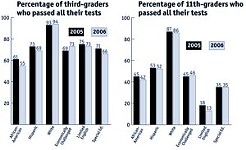Naked City
Foes Emerge for AISD Bonds
By Rachel Proctor May, Fri., Aug. 13, 2004
At issue, they said, is more than the maintenance problems that emerge when lowball contractors use cheaper, inexperienced workers to churn out shoddy buildings. Rather, low wages force many workers to depend on public assistance for necessities like health care, and cost taxpayers more in the long run. "It's not only the people who do the work who benefit from adopting the prevailing wage," said Will Rogers of the Texas State Employees Union. "It's the taxpayers who foot the bill, the teachers who have to teach in those buildings, and the children who have to learn in those buildings." The Central Labor Council will decide whether to endorse the bond package next week, and will base their decision on whether the board commits to the DOL scale.
Meanwhile, at a meeting Tuesday night at Little Mexico restaurant, several members of the South Austin Democrats also expressed concerns about the district's as-yet nonexistent prevailing-wage policy. But the big issue was sprawl, and it was big enough to cause the roughly 50 SAD members to vote narrowly to oppose two of the propositions. The no's came in initially just shy of a majority, but an instant run-off tallied the second choices of the people whose first choice was to take the no position – and that pushed the negative vote to victory. (Afterward, bond supporter Alfred Stanley complained to the online Austin politics newsletter In Fact Daily, "A majority of South Austin Democrats was opposed to taking a position against the bonds but the minority prevailed. This is South Austin butterfly balloting.")
The rejected issues were Proposition 1, which would fund seven new schools in Austin's outskirts and pay for renovations to campuses throughout the district, costing $183 million, and Proposition 5, which would spend $44 million on a new middle school in southwest Austin and partially fund a performing arts center to serve the whole district.
Bill Bunch, director of the Save Our Springs Alliance, voiced the concerns shared by many who voted no, saying that the new buildings would promote sprawl on the edges of town while neglecting older schools in the central city. He added that it was particularly annoying that the board had paired the new middle school in a single proposition with the performing arts center. "I personally was convinced that we need a performing arts center, but I cannot in good faith vote for it," he said.
AISD trustees John Fitzpatrick and Robert Schneider, as well as former mayor Gus Garcia and Alfred Stanley of the Committee for Austin's Children (the group organized to promote the bonds) begged to differ. They argued that the new schools simply respond to existing growth, and that sufficient renovations are planned to achieve functional equity between new and older schools. While the South Austin Democrats remained unconvinced, bond proponents still have a month to convince the rest of Austin to approve the package, which will cost the owner of a median-priced home $6 a month in property-tax increases. The final vote comes Sept. 11.
Got something to say on the subject? Send a letter to the editor.










